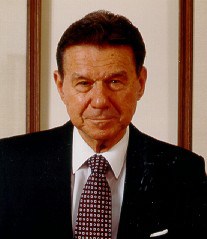Armand Feigenbaum
| Armand Feigenbaum |
|---|
| See also |
Armand Vallin Feigenbaum was born in 1922 in the United States. He died in 2014. He graduated from Union College, the with title of bachelor and then got a master's degree from MIT Sloan School of Management. From 1958-1968 he was director in charge of production and quality control at General Electric Company. From 1961-1963 he was president of the American Society of Quality Control, and then the president of the General System Company in Pittsfield, Massachusetts.
Dr. Feigenbaum is the father of the concept of Total Quality Control and the author of many books, dealing with the subject of quality management. In 1951 he released his book Quality Control. This book is a thorough analysis covering the whole area of quality control. The author helped to develop the idea of quality control, making the fragmented and limited knowledge of a coherent system of principles, practices and technologies, known as Total Quality Control (TQC).
Biography
- 1922, April 6 - New York City, NY - date of birth
- 1937 - 1958 - work in General Electric Company, NY
- 1951 - the first book Quality Control: Principles, Practice, and Administration published
- 1958 - 1968 - Director of Manufacturing Operations, General Electric Company
- 1958 - 1961 - V-ce President of the American Society for Quality
- 1961 - 1963 - President of the American Society for Quality
- 1968 - CEO, General Systems Company Pittsfield MA
- 1988 - appointed to the first Board of Overseers of the Malcolm Baldrige National Quality Award Program.
- 1992 - elected to the National Academy of Engineering of the United States.
- 1998 - the American Society for Quality established the Feigenbaum Medal to be granted annually for excellence in performance
- 2005 - The Feigenbaum Leadership Excellence Award was established in Dubai
- 2014, November 13 - Pittsfield, MA - date of death
Philosophy
Quality and profitability
Armand Feigenbaum wrote "Total quality control is an effective system for integrating the quality development, quality maintenance, and quality improvement efforts of the various groups in an organization so as to enable production and service at the most economical levels which allow full customer satisfaction"[1].
Hidden plant
The hidden plan (hidden factory) consists of all the work performed to repair products that weren't done right first time. If the worker has to repair his work, cost of time, energy and tools usually is not registered. It's only visible through poor productivity. But knowing the productivity level is not enough to understand causes of problems. The concept is related to quality costs. Feigenbaum proposed do improve productivity through identification of causes and their removal. To achieve this, a set of methods can be used, e.g. Failure Mode and Effects Analysis, Kaizen, 7 quality tools[2].
Total Quality Control
The "Total Quality Control" is the most important book by Armand Feigenbaum. Together with works of Joseph M. Juran, William Edwards Deming and Walter A. Shewhart it allowed to move quality movement towards quality assurance and then quality management.
The book was translated into many languages, and its still important source of knowledge about quality[3].
Total Quality Control principles
Dr. Feigenbaum defined several TQC principles, which are the base of the modern quality approach in company[4]:
- Quality is the customers perception of what quality is, not what a company thinks it is.
- Quality and cost are the same not different.
- Quality is an individual and team commitment.
- Quality and innovation are interrelated and mutually beneficial.
- Managing Quality is managing the business.
- Quality is a principal.
- Quality is not a temporary or quick fix but a continuous process of improvement.
- Productivity gained by cost effective demonstrably beneficial Quality investment.
- Implement Quality by encompassing suppliers and customers in the system.
References
- ↑ Feigenbaum Foundation
- ↑ The hidden factory
- ↑ Armand V. Feigenbaum (1991), Total Quality Control, 3rd edition
- ↑ Feigenbaum Foundation
Author: Slawomir Wawak
